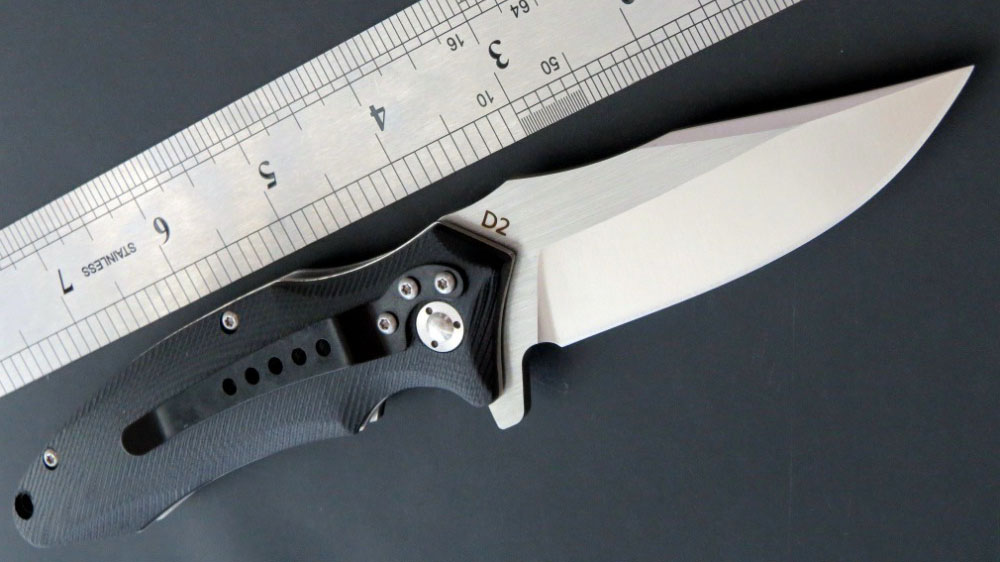D2 Tool Steel Hardness, D2 Metal Heat Treatment & Properties
D2 Steel – Tool, Die and Blade Steel
D2 steel is a kind of ledeburite tool steel, which is the most available and popular among D-series tool steels. Its hardness can reach 60+HRC after heat treatment. The material contains up to 1.6% carbon and 13% chromium, so it’s also known as semi-stainless steel, but the high chromium content is not enough to provide the corrosion resistance of stainless steel because much of the chromium is incorporated in alloy carbides. It is deep hardening with low distortion and high safety in hardening. It also has high resistance to softening and medium resistance to decarburizing and it is easy to nitridize. D2 tool steel has high wear resistance and good toughness and is therefore known as the blade steel.
D2 Tool Steel Properties
The following tables show D2 tool steel properties including chemical composition, physical and hardness, etc.
Chemical Composition
D2 tool steel chemical composition is listed in the following table.
| D2 Steel Composition, % | |||||||||
| Standard | AISI | C | Si | Mn | P, ≤ | S, ≤ | Cr | Mo | V |
| ASTM A681 | D2 | 1.40-1.60 | 0.10-0.60 | 0.10-0.60 | 0.030 | 0.030 | 11.00-13.00 | 0.70-1.20 | 0.50-1.10 |
Physical Properties
D2 metal physical properties are listed in the table below including density, melting point, specific heat, elastic modulus (modulus of elasticity), thermal conductivity, and coefficient of thermal expansion (CTE).
Notes:
- 10-6·K-1 = 10-6/K
- 1 Ω·mm²/m = 1 μΩ·m
- 1 g/cm3 = 1 kg/dm3 = 1000 kg/m3
- 1 GPa = 1 kN/mm2
- 1 MPa = 1 N/mm2
| D2 Material Physical Properties | |
| Density, g/cm3 (lb/in3) | 7.70 (0.278) |
| Melting point, °C (°F) | 1420 (2590) |
| Specific heat capacity, J/kg·K (Btu/lb ·°F) | 460 (0.11) at 20 °C (68 °F) |
| Elastic modulus (Modulus of Elasticity), GPa (106 psi) | 210 (30) |
| 200 (29) at at 200 °C (390 °F) | |
| 180 (26) at 400 °C (750 °F) | |
| Thermal conductivity, W/m·K (Btu/ft · h ·°F) | 20.0 (11.58) at 20 °C (68 °F) |
| 21.0 (12.17) at 200 °C (390 °F) | |
| 23.0 (13.33) at 400 °C (750 °F) | |
| Coefficient of thermal expansion (CTE), μm/m·K | 10.4 at 20-100 °C |
| 10.3 at 20-200 °C | |
| 11.9 at 20-425 °C | |
| 12.2 at 20-540 °C | |
| 12.2 at 20-650 °C | |
| Coefficient of thermal expansion (CTE), μin./in. ·°F | 5.8 at 70-200 °F |
| 5.7 at 70-400 °F | |
| 6.6 at 70-800 °F | |
| 6.8 at 70-1000 °F | |
| 6.8 at 70-1200 °F | |
D2 Material Heat Treatment
Annealing
D2 tool steel annealing temperature: 870-900 °C (1600-1650 °F), rate of cooling: 22°C (40 °F), hardness: 217-255 HB.
Note: The upper limit of the range applies to large sections and the lower limit to smaller sections. The time to keep the temperature varies from 1 hour for light sections to 4 hours for heavy sections and large furnace charges of high-alloy steel.
Hardening and Tempering
- Preheat Temperature: 1500 °F (816 °C);
- Austenitizing Temperature: 1825 °F (996 °C) Salt Bath; 1850 °F (1010 °C) Controlled atmosphere furnaces;
- Austenitizing Time: 10-20 minutes;
- Qunching in air;
- Tempering temperature: 400 °F (204 °C), 2 hours temper; Minimum Rockwell hardness is 59 HRC.
- For high hardness (>59 HRC), use a low tempering temperature.
Applications
D2 metal can be used to manufacture cold work die steels with large cross-sections, complex shapes, high impact resistance, and high wear resistance. Typical applications including:
- Blanking dies
- Burnishing tools
- Space needles,
- Coining dies
- Deep-drawing dies
- Wire-drawing dies
- Forming dies
- Gages
- Thread-rolling dies
- Lathe centers
- Punches
- Threaded rollers
- Forming and bending rolls
- Thread rolling jaws and rolls
- Sendzimir rolls
- Trimming dies
- Spinning tools
- Slitting cutters
- Shaping and pressing rollers
- Knurls
- Broaches
- Pressing dies and matrices
- Cold-extrusion dies
- Wear plates
- Mandrels
- Countersink and pressure piles
- Crimping dies
- Hot-swaging dies
- Lamination dies
- Milling cutters
- Cutlery
- Shear blades and knives, etc.
D2 Steel Equivalent Material
AISI D2 steel equivalent to European EN (Germany DIN, British BSI, French NF…), ISO, Japanese JIS and Chinese GB standard (For reference).
Note: The Japanese equivelent material is SKD10, not SKD11. But SKD11 is more well-known and commonly used than SKD10.
| D2 Steel Equivalent Material | |||||||||||||||||
| US | European | Japan | ISO | China | Australia | India | Rusia | Korea | |||||||||
| Standard | AISI (UNS) | Standard | Steel Number (Steel Name) | Standard | Grade | Standard | Steel Number (Steel Name) | Standard | Name | Standard | Grade | Standard | Grade | Standard | Grade | Standard | Grade |
| AISI, ASTM A681 | D2 (T30402) | EN ISO 4957 | 1.2379 (X153CrMoV12) | JIS G4404 | SKD10 | ISO 4957 | 1.2379 (X153CrMoV12) | GB/T 1299 | Cr12Mo1V1 | ||||||||

